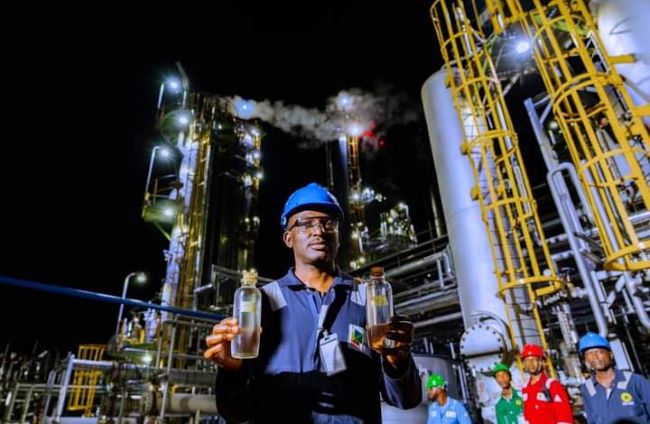Port Harcourt Refinery Resumption: Celebration vs Skepticism
Truth is Nigerians would rather celebrate than villify any govrnment action that provides meaningful contributions in their lives.
 There was excitement in the air on November 26, 2024, when the Nigerian National Petroleum Company Limited (NNPCL) announced that the Port Harcourt Refinery had resumed operations at a capacity of 60,000 barrels per day (bpd), with claims of producing significant quantities of petrol, diesel, and kerosene. According to NNPCL spokesperson Femi Soneye, the refinery was operating at 70% capacity, with plans to ramp up to 90% soon. Reports indicated that it was expected to produce 1.4 million litres of petrol, 900,000 litres of kerosene, and 1.5 million litres of diesel daily.
There was excitement in the air on November 26, 2024, when the Nigerian National Petroleum Company Limited (NNPCL) announced that the Port Harcourt Refinery had resumed operations at a capacity of 60,000 barrels per day (bpd), with claims of producing significant quantities of petrol, diesel, and kerosene. According to NNPCL spokesperson Femi Soneye, the refinery was operating at 70% capacity, with plans to ramp up to 90% soon. Reports indicated that it was expected to produce 1.4 million litres of petrol, 900,000 litres of kerosene, and 1.5 million litres of diesel daily.
Port Harcourt Refinery: Revival signals new era for Nigeria
The recent announcement of the resumption of operations at the Port Harcourt Refinery has however ignited a fervent debate among stakeholders, industry experts, and the general public.
After being dormant for 22 years, Port Harcourt Refinery resumption should be celebrated as a pivotal step towards Nigeria’s energy self-sufficiency. However, this optimism has been clouded by conflicting reports and doubts regarding its actual operational status, capacity and output.
Skepticism arose almost immediately. Timothy Mgbere, Secretary of the Alesa community stakeholders (who live near the refinery) alleged that the products loaded from the facility were not freshly refined but rather old stock that had been sitting in storage tanks for over three years. He claimed that only six trucks were loaded on the day of the announced resumption, contrary to NNPCL’s assertion that 200 trucks would be dispatched daily.
This claim has been echoed by various community members who described the event as a mere fanthom “show” rather than a genuine operational restart.
Reactions from other Nigerians
The reactions from industry experts and stakeholders have been mixed. Representatives from the Petroleum Products Retail Outlet Owners Association of Nigeria (PETROAN) defended NNPCL’s claims. They asserted that they had firsthand evidence of operational activities at the refinery and confirmed that it was indeed producing refined products as stated by NNPCL.
Billy-Gillis Harry, PETROAN’s national president, noted his visit to the facility and insisted on its functionality, stating that blending processes are standard practice in refineries globally.
In contrast Farooq Kperogi, a prominent media commentator, expressed concern over the transparency of NNPCL’s operations and called for independent verification of the Port Harcourt Refinery resumption claims. He emphasized the need for accountability in an industry plagued by mismanagement and corruption. He points out that there are allegations suggesting the refinery may be functioning more as a blending plant rather than a full-fledged refining operation. This distinction is crucial because blending does not equate to processing crude oil, which undermines the refinery’s intended purpose and Nigeria’s goal of achieving energy self-sufficiency.
The Blending Controversy
One major point of contention is whether the Port Harcourt Refinery is merely blending products rather than refining crude oil. Critics argue that blending semi-finished or finished products does not equate to true refining capabilities and could mislead consumers about the refinery’s operational status. This debate highlights a broader issue within Nigeria’s oil sector; that is, whether facilities are genuinely contributing to local production or simply repackaging imported goods.
So, Has Refining Really Commenced or not?
Based on available evidence, it appears that while some operations have resumed at the Port Harcourt Refinery, claims regarding its full operational capacity and output remain contentious. The allegations from community leaders about loading old stock raise serious questions about NNPCL’s transparency and reliability. While PETROAN supports NNPCL’s assertions, independent verification is crucial to ascertain whether true refining has commenced or if the facility is functioning primarily as a blending plant. In conclusion, while there are indications that some level of production has started at Port Harcourt, definitive evidence supporting robust refining operations is still lacking. Stakeholders must demand clarity from NNPCL to ensure that Nigerians receive accurate information regarding this critical national asset.
Key Factors Affecting Reputation
Repeated Delays and Failed Deadlines: The refinery has experienced seven failed deadlines for resuming operations, which has fostered a perception of incompetence and mismanagement within the Nigerian National Petroleum Company Limited (NNPCL).
This history of delays has created a narrative that undermines confidence in the refinery’s ability to contribute meaningfully to Nigeria’s energy needs.
Community Discontent: The local communities surrounding the refinery have expressed frustration over the lack of transparency and engagement from NNPCL and the contractors involved in the rehabilitation efforts. Mgbere highlighted that there has been no meaningful interaction between the contractor, Maire Tecnimont SpA, and the local community, which has compounded feelings of neglect and distrust
This disconnect further tarnishes the refinery’s reputation as it is seen as failing to fulfill its role as a community asset.
Such discrepancies between media narratives and real-world conditions can damage public trust in both NNPCL and the refinery itself.
The cumulative effect of serial delays, misleading claims, community dissatisfaction, and questions about operational integrity has severely impacted the reputation of the Port Harcourt Refinery. Stakeholders are calling for greater transparency and accountability from NNPCL to restore confidence in this vital national asset. Without significant improvements in communication and operational clarity, the refinery risks remaining a symbol of inefficiency rather than a beacon of Nigeria’s energy self-sufficiency ambitions.
Nigerians undoubtedly desire for the Port Harcourt Refinery and , indeed, all other NNPC refineries to become fully operational. It is the general belief that once they join Dangote Refinery and other modular refineries to produce petroleum products including petrol, desiel and kerosene locally, the energy costs currently asphyxiatiating families, home, offices and businesses would ease off, so that the depressed economy can begin a rebound urgently. Truth is Nigerians would rather celebrate than villify any govrnment action that provides meaningful contributions in their lives.












